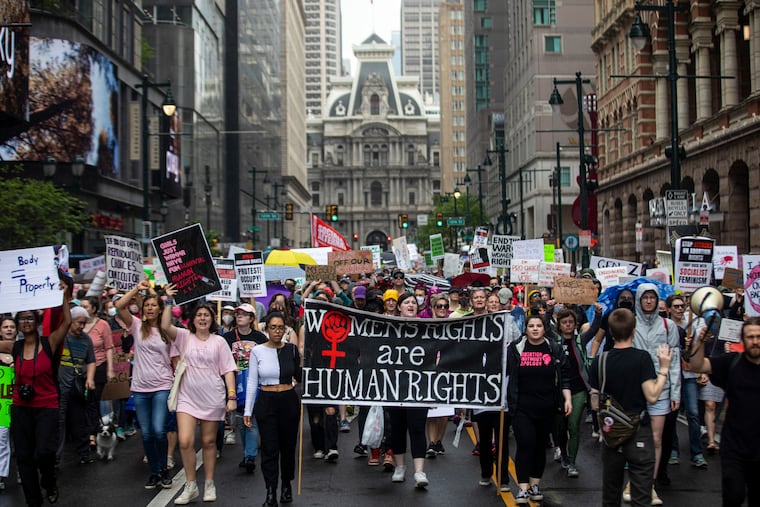On social media, people are offering their homes to abortion seekers — but existing networks still need help
But without getting in touch with already-existing aid networks, the newly politically active might risk reinventing the wheel, activists said.

The prospect that the U.S. Supreme Court could soon strike down its landmark abortion-rights decision in Roe v. Wade has galvanized some social media users — from Pennsylvania to Colorado, and New Jersey to Canada — to organize an unofficial abortion aid network for the internet age.
On sites like TikTok, women are posting videos offering out-of-state abortion seekers a place to stay and assistance with transportation, with some using code words like camping or sightseeing instead of abortion.
“If anyone needs a ‘vacation to the woods,’ consider the campfire already started,” wrote one woman, who said she lived in Pennsylvania, tagging the post “#roevwade.” “I’ve got a cozy and safe tiny shed for relaxation and recovery.”
“Camping season in Pennsylvania is 24 weeks,” she said, referencing the weeks of pregnancy in which abortion would still be legal in the commonwealth.
While thousands of commenters have chimed in offers of help, providers and abortion-rights activists say reliable networks already are in place. Many have been operating for decades to help people seeking abortions. Organizers say donating or volunteering for existing organizations is far more effective.
The Abortion Liberation Fund of Pennsylvania has been helping lower-income patients cover the cost of an abortion since 1985.
“If you’re outraged and feeling the need to take action, we don’t want to curb that. But there’s too much at stake for folks to walk into this without having done their due diligence,” said Elicia Gonzales, the fund’s executive director. “Abortion seekers need to be handled with care, with folks who are skilled and have experience in knowing how to deal with the range of issues.”
Without getting in touch with already-existing aid networks, the newly politically active risk duplicating services and alienating vulnerable populations whose needs they may not understand. Most people getting abortions in Pennsylvania are early along in their pregnancy, in their 20s, and unmarried. Black people were nearly seven times as likely as white people to seek out abortions in 2020, according to information from the Pennsylvania Department of Health.
» READ MORE: Who gets abortions in Pennsylvania, according to the data
“This assumption of a lack of an existing system isn’t malicious, but undermines the foresight, brilliance, and collaboration” of reproductive justice organizers, especially Black women, said Beulah Osueke, the deputy director of New Voices for Reproductive Justice, an organization that focuses on the needs of Black women and people across the full spectrum of gender identities in Pennsylvania and Ohio.
“I sense a lot of frustration, because this has been happening,” Osueke said. “Access has been restricted. And Black women in particular, poor people in particular, face a set of obstacles that white people, people who have financial means, were not privy to.”
Established local networks already in place
Those who want to help abortion seekers should research the organizations already working in their community, and contact those groups with offers for funding or volunteer time, activists say.
Long-standing organizations such as the Abortion Liberation Fund of Pennsylvania have established routines for providing funds to people seeking abortions across state lines. The group is also accustomed to working with communities statewide, such as recently coordinating a house party around a request for outreach in York, Pa.
» READ MORE: Opposition to abortion doesn’t stop some Americans from supporting friends and family who seek one
People who aren’t ready to host a patient recovering from an abortion, or to be a clinic escort, can get involved simply by talking more about abortion, said Gonzales, the executive director.
“Sometimes we ask folks to support a person who needs to travel out of state because of PA’s gestational limits. Sometimes we partner with sibling funds to get folks across state lines,” she said.
The Women’s Centers, a network of independent abortion providers in several states, including Pennsylvania and New Jersey, needs clinic escorts to help patients “when there’s a lot of harassment and violence outside our facilities,” said Lizbeth Rodriguez, the Pennsylvania community engagement coordinator.
“A lot of the antiabortion legislation is meant to confuse folks,” Rodriguez said. “We always just try to reassure them — you are being seen, and connecting folks to other practical support networks.”
Nationally, the established networks helping abortion seekers cover health-care costs, transportation, housing, and child care during the procedure are known as “practical support organizations,” said Tessa Benson, the deputy director of Apiary, a nonprofit that supports their work across the country.
Practical support organizations often fly under the radar, Benson said, but have developed sets of best practices for abortion seekers through decades of experience — and sometimes simple trial and error. Now, those organizations typically train volunteers on how best to help patients.
“People who are not tapped into this network don’t realize some of these systems are already established and in place and are wanting to create something on their own — they’re folks who are really well-intentioned and wanting to plug in in ways that are actionable and meaningful,” Benson said. “When there’s a crisis in the abortion access world, people get really fired up about contributing in any way they can.”